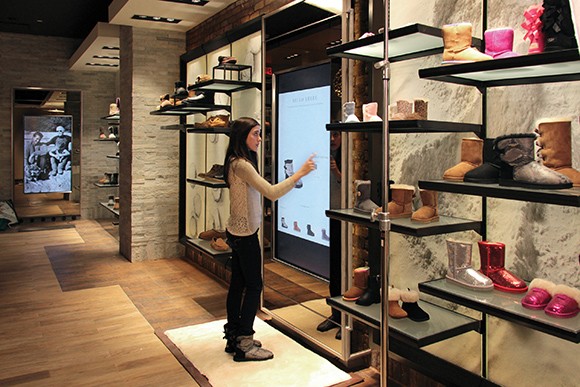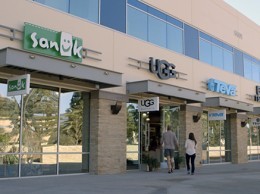
A shopper navigates Deckers Brands’ so-called omni-channel retail concept at the company’s newest Ugg Australia store, in Washington, D.C. (Courtesy image)
As Goleta-based Deckers Brands enters its peak retail selling period — close to 80 percent of its direct-to-consumer revenue is generated in the third and fourth quarters — it will seek to use its new high-tech store concept to turn physical shoppers into virtual ones as holiday sales migrate online.
According to the National Retail Federation, consumers will do 44 percent of their holiday shopping on the Web this year, up from 40 percent last year. Publicly traded Deckers Outdoor Corp., parent company of Deckers Brands, will focus retail buildout on its keystone brand, Ugg Australia, whose insulated styles it perennially banks on to drive sales throughout winter.
In the company’s most recent earnings release, it announced total second-quarter revenues and earnings were up more than 20 percent compared to the same period a year ago. But beneath this number was a $7.1 million loss at retail stores for the quarter, compared to an income of $7.4 million from e-commerce and $340 million from wholesale.
Many retailers feel that the Internet has trained consumers to better target deals, both on- and offline. With the ability to research then meticulously plan their next visit to the mall, shoppers are proving more intentional and less indulgent.
Deckers President and CEO Angel Martinez described this shift as “nothing short of dramatic,” but said the company plans to drive online sales by using its physical locations to expose customers to its e-commerce presence.
“The consumer is now completely in charge and is dictating what distribution models will work and what models will fail at a rapid pace,” Martinez said. “The days of visiting the mall to peruse and shop have changed and are evolving. Now it’s all about building strong brands and creating access to products through integrated, multichannel distribution platforms that make it as convenient as possible for consumers to review and purchase the products they want.”
The D.C. store is the first full realization of the omni-channel concept, unveiled at the Deckers’ Goleta headquarters in March, which uses touchscreens and tablets to turn its stores into a sort of Apple store for shoes. The company hopes the latest location’s integration of the online and brick-and-mortar shopping experience will augment revenue in both forms of reality.
“E-commerce is feeding stores and stores are feeding e-commerce, and I think that’s going to continue,” Martinez said. “And our model is gearing us up to be ready for that changes in the marketplace and the consumer shopping behavior, which I think will benefit us in the long-term.”
Deckers has opened 18 new Ugg retail locations over the past 12 months, with eight in the U.S. and Canada and the remainder in the Asia-Pacific region. According to the company’s omni-channel division president, David Powers, despite the relatively small contribution in-store sales have made toward total revenue last quarter, the company is “confident that our multichannel approach has given us the leverage to react to global trends and challenges.”
“Internet Ugg, which gives our retail stores the ability to sell every SKU available from the Ugg brand through our in-store POS system, is enhancing the consumer experience, improving our inventory productivity and driving higher sales,” Powers said.
The company is expanding its omni-channel infrastructure to all North American stores, as well as concept stores in Japan, and will then launch the program in Europe. “We believe that our initiatives will continue to elevate our brands above the competition, and once again make Ugg the No. 1 most desired brand this holiday season,” Powers said.
Supporting his argument, traffic at North American Ugg stores rose an average of 20 percent over the last year. The total amount of sales that foot traffic led to may not be properly represented by the company’s retail revenue figure, which doesn’t include e-commerce purchases made in-store.
So far, those purchases are only around 5 percent of total e-commerce sales. “We haven’t put a number as the target as to what we think it could be, but it is continuing to increase,” Powers said. “And as we open more stores, more locations can become a more significant part of the e-commerce business. The other big benefit of that, obviously, is we gain all that consumer data and we can retarget them where we can build our relationship for the long-term [customer relationship management] program.”
In fact, Powers said the company has increased e-commerce sales by 29 percent over last year, and this number is even larger in markets where it has opened stores. Encouraged by these figures, this winter the company will also foray into pop-up locations, including its first-ever store to sell its slippers, loungewear and home products. In Manhattan, it will even offer same-day delivery service during the holiday season this year.
Thomas George, the company’s chief financial officer, said it will use these smaller ventures to pierce what it considers under-penetrated markets — “locations where we either want to test to see if it is viable for a long-term lease for a store, or to just take advantage of the peak-selling season.”
George said the strategy is attractive as buildout costs are low and the store’s opening can be constrained to Deckers’ core selling season. The company is planning to add another 12 stores before its fiscal year closes in March.
“We believe we’re making the right choices and making the necessary investments in our business to not only adjust to how consumers shop today, but to thrive in this continually challenging global retail environment,” Martinez said.






 Print
Print Email
Email

















